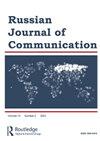The illusion of freedom: propaganda and the informational swamp
Q1 Social Sciences
引用次数: 0
Abstract
Having found myself in Tallin as a school boy, I eagerly awaited a chance to watch TV. For those of us residing in Riga, Estonia was a place where you could catch a glimpse of the TV programing from Finland. Or so the rumor had it. My persistence paid off eventually, and when I had my wish granted I was treated to an excruciatingly boring concert of Finnish folk singing. Not a bit discouraged, I assumed that this first encounter with Europe was a programing fluke and that my curiosity would be rewarded next time. Never did I stop envying those lucky enough to watch broadcasts from the West. The luckiest folks naturally lived in East Berlin. Unable to cope with the competition, the communist authorities built the tallest transmitting tower in Germany that still disfigures Berlin. This trick failed to block the competitor, however. Once that became clear, the Eastern rulers settled on point-by-point rebutting the news reaching its citizens from the West, offering instead a steady diet of Marxist propaganda. The whole operation was as futile as it was expensive – only the news coming from the West was deemed to be trustworthy. It is easy to infer from this that inhabitants of the East German capital were best informed about the Western world. After all, TV is the face of a nation, its national character and ideals splashed all over the TV screen. Sitcoms and advertisements do much better job than sermons and constitutions in getting across a nation’s ethos and etiquette, its unwritten yet pervasive laws. I learned that much when I made my way to the United States where I encountered a language of mass culture unfamiliar to me. Such language is essential when it comes to reading subtle cues and hidden citations, understanding jokes and punch lines, and what is equally important – distinguishing kindred people from those of a different kind. Surely, those watching a TV show like ‘Rosanne’ will vote for different candidates than those favoring ‘Seinfeld’ or M*A*S*H. This has nothing to do with a political message that the show producers might want to impart – viewers are the ones who attribute meaning to what they observe on the screen. Producers merely tap into their audience’s fickle moods. As any market phenomenon, mass culture is a risky investment. Even when pitched to a target audience, its product’s impact is hard to calculate. Ever so tentatively, mass culture自由的幻觉:宣传和信息沼泽
在塔林上学的时候,我急切地等待着看电视的机会。对于我们这些住在里加的人来说,爱沙尼亚是一个你可以瞥见芬兰电视节目的地方。至少谣言是这么说的。我的坚持最终得到了回报,当我的愿望实现时,我被邀请去听了一场极其无聊的芬兰民歌音乐会。我一点也不气馁,我以为第一次与欧洲的邂逅是编程上的侥幸,下次我的好奇心会得到回报。我一直羡慕那些有幸观看西方广播的人。最幸运的人自然是住在东柏林。由于无法应对竞争,共产主义当局建造了德国最高的发射塔,至今仍使柏林颜面扫地。然而,这一招没能挡住对手。一旦这一点变得清晰,东方统治者决定逐点反驳从西方传到其公民手中的新闻,取而代之的是提供稳定的马克思主义宣传。整个行动既徒劳无功又耗资巨大——只有来自西方的消息才被认为是可信的。由此不难推断,东德首都的居民最了解西方世界。毕竟,电视是一个国家的面孔,它的民族性格和理想在电视屏幕上随处可见。情景喜剧和广告比布道和宪法更能传达一个国家的精神和礼仪,这是它不成文但普遍存在的法律。当我去美国的时候,我学到了很多,在那里我遇到了一种我不熟悉的大众文化语言。当涉及到阅读微妙的线索和隐藏的引用,理解笑话和妙语时,这种语言是必不可少的,同样重要的是——区分同类和不同类型的人。当然,那些看《罗珊娜》(Rosanne)之类电视节目的人会把票投给不同的候选人,而不是那些喜欢《宋飞正传》(Seinfeld)或《风流女子医院》(M* a *S*H)的人。这与节目制作人可能想要传达的政治信息无关——观众才是赋予他们在屏幕上看到的东西意义的人。制作人只不过是利用了观众变幻无常的情绪。和任何市场现象一样,大众文化是一种有风险的投资。即使向目标受众推销,其产品的影响也难以计算。试探性地说,大众文化
本文章由计算机程序翻译,如有差异,请以英文原文为准。
求助全文
约1分钟内获得全文
求助全文
来源期刊

Russian Journal of Communication
Social Sciences-Political Science and International Relations
自引率
0.00%
发文量
0
期刊介绍:
Russian Journal of Communication (RJC) is an international peer-reviewed academic publication devoted to studies of communication in, with, and about Russia and Russian-speaking communities around the world. RJC welcomes both humanistic and social scientific scholarly approaches to communication, which is broadly construed to include mediated information as well as face-to-face interactions. RJC seeks papers and book reviews on topics including philosophy of communication, traditional and new media, film, literature, rhetoric, journalism, information-communication technologies, cultural practices, organizational and group dynamics, interpersonal communication, communication in instructional contexts, advertising, public relations, political campaigns, legal proceedings, environmental and health matters, and communication policy.
 求助内容:
求助内容: 应助结果提醒方式:
应助结果提醒方式:


